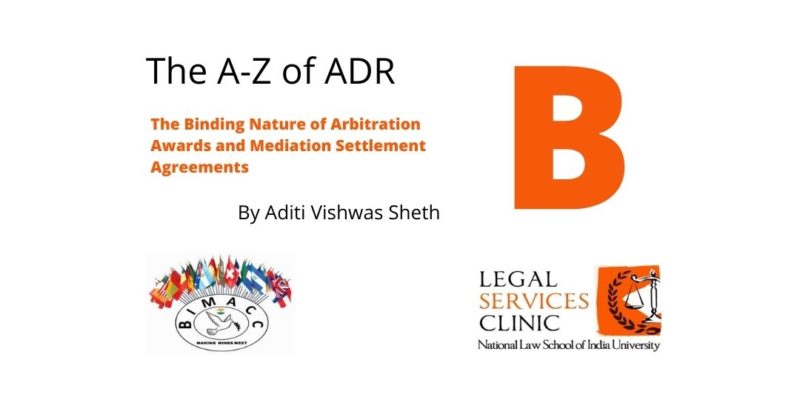
A-Z of ADR: Binding Nature of Arbitration Awards and Mediation Settlement Agreements
– Aditi Vishwas Sheth (II Year, NLSIU Bangalore)
The Binding Nature Of An Arbitral Award
The procedure for enforcement and execution of Arbitral awards in India is primarily governed by the Arbitration & Conciliation Act, 1996. Unless the award is challenged and/or set aside by the court, it will assume a binding character. Any domestic award may be challenged only within three months of the receipt of the award under Section 34 of the Arbitration & Conciliation Act, 1996. After the expiry of three months, if a court finds the award to be enforceable, at the stage of execution, there can be no further challenge as to the validity of the arbitral award. Any request for a stay of execution of arbitral awards post the Arbitration and Conciliation (Amendment) Act, 2015 (“Amendment Act”), has to be made under a separate application from the one challenging the award.
-Foreign Award-
India is a signatory to the Convention on the Recognition and Enforcement of Foreign Arbitral Awards, 1958 (“New York Convention”) as well as the Geneva Convention on the Execution of Foreign Arbitral Awards, 1927 (“Geneva Convention”). If a party receives a binding award from a country which is a signatory to the New York Convention or the Geneva Convention and the award is made in a territory which has been notified as a convention country by India, the award would then be enforceable in India.
To enforce a foreign award in India, one must follow a two-fold process. The first step is the filing of an execution petition, after which a court determines whether the award adhered to the requirements of the Act. Once an award is found to be enforceable it may be enforced like a decree of that court. However, the opposite party may file objections and require the filing of an original/authenticated copy of the award and the underlying agreement before the court.
Enforcement of a foreign award may be refused[1] and a domestic award may be set aside[2] if it is proven that:
- The parties to the agreement were under some incapacity.
- The agreement in question is not in accordance with the law to which the parties have subjected it, or under the law of the country where the award was made (especially in case of foreign awards).
- There is a failure to give proper notice of appointment of an arbitrator or arbitral proceedings or the party against whom the award was rendered was otherwise unable to present his case.
- The award is ultra vires the agreement or submission to arbitration.
- The award contains decisions on matters beyond the scope of submission to arbitration.
- The composition of the arbitral authority or the arbitral procedure is ultra vires the agreement.
- The composition of the arbitral authority or the arbitral procedure is not in accordance with the law of the country where the arbitration took place.
- The award (specifically a foreign award) has not yet become binding on the parties or has been set aside or suspended by a competent authority of the country in which, or under the law of which that award was made.
- The subject matter of the dispute is not capable of settlement by arbitration under Indian law.
- The enforcement of the award would be contrary to the public policy of India.
The Binding Nature Of Settlement Agreements and Arbitral Awards
A settlement
agreement is an agreement drawn out by a conciliator on the basis of his notes
during the conciliation proceedings, written statements and the documentary
evidence of the parties. The same is then forwarded to the parties and once both parties are amenable to
terms of the agreement and sign it, it is sent to the conciliator for due
authentication. Only after all components are satisfied does it become final
and binding on both parties and the persons claiming under them.[3]
The settlement agreement has the same status as an arbitral award does under
Section 30 of the Arbitration & Conciliation Act, 1996.[4]
Section 30(4) further states that “an arbitral award on agreed terms shall have
the same status and effect as any other arbitral award on the substance of the
dispute”. This means that the settlement award too would be open to challenge
on the grounds listed above with reference to
an arbitral award.
[1] Section 48, Arbitration & Conciliation Act, 1996
[2] Section 34, Arbitration & Conciliation Act, 1996
[3] Section 73 of the Arbitration & Conciliation Act, 1996 interpreted in Mysore Cements Limited v. Svedela Barmac Ltd (2003) 10 SCC 375
[4] Section 74 of the Arbitration & Conciliation Act, 1996
– Aditi Vishwas Sheth (II Year, NLSIU Bangalore)
Aditi Vishwas Sheth is a second-year student from the National Law School of India University (NLSIU), Bangalore.
BIMACC expresses its gratitude towards the author and to the members of the Legal Services Clinic, National Law School of India University (NLSIU) for their support in our collaborative efforts to promote ADR with this series titled “A-Z of ADR”. The purpose of this series is to increase the understanding of certain fundamental concepts of Alternative Dispute Resolution.
The Legal Services Clinic is a student-run committee that provides free legal services to the socially and the economically backward sections of the society who have difficulty accessing the judicial system. It also has a mandate of spreading legal awareness and providing free legal assistance to those who cannot afford it.
Website: www.legalservicesclinic.org/
Facebook: @legalservicesclinic
Email: lsc.nlsiu@gmail.com
Phone Number: 073586 73214
Disclaimer: The views and opinions expressed in this blog are those of the author and do not necessarily reflect the official policy or position of BIMACC, any of the members of the Board, or the empanelled neutrals. This blog is for informative purpose only and does not constitute legal advice in any manner whatsoever.
